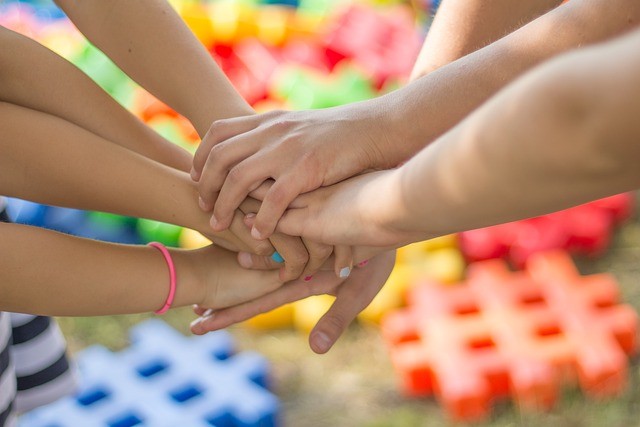Empathy is a crucial building block towards a more inclusive society because it allows us to understand and connect with others on a deeper level. When we are empathetic, we can put ourselves in someone else’s shoes, recognize their experiences, emotions, and perspectives. This understanding helps break down barriers and fosters an environment of acceptance and respect.
Here are a few reasons why empathy is essential for building inclusivity:
- Promotes Understanding: Empathy enables us to see beyond our own biases and assumptions by actively listening to others’ stories and experiences. It helps us appreciate the diversity of human experiences, challenges, and triumphs.
- Encourages Collaboration: When people feel understood and valued for who they are, they are more likely to engage in collaborative efforts towards common goals. Empathy creates an environment where individuals from different backgrounds can come together to work towards solutions that benefit everyone.
- Reduces Discrimination: Empathy allows us to challenge stereotypes by recognizing the unique qualities of each individual rather than making assumptions based on their identity or background. It helps break down prejudices that may lead to discrimination or exclusion.
- Fosters Connection: Inclusive societies thrive on strong social connections between individuals from various backgrounds. By practicing empathy, we build bridges between people who may have previously felt isolated or marginalized.
- Drives Positive Change: Empathy motivates action by inspiring individuals to address social injustices or inequalities that they witness around them. It encourages advocacy for equal rights, opportunities, and access for all members of society.
Children are born with a capacity for empathy. Research suggests that even infants show signs of empathy, such as crying when they hear other babies cry. As they grow and develop, children continue to learn and refine their empathetic abilities through experiences and interactions with others.
When aiming to create a more inclusive society, it is important for parents and caregivers to nurture and encourage empathy in children by modelling empathetic behavior themselves and providing opportunities for them to practice empathy in their daily lives.
How to Develop Empathy in Childhood
Developing empathy in childhood is crucial for fostering positive relationships and building emotional intelligence. Here are some suggestions to help children develop empathy:
- Lead by example: Children learn a lot by observing their parents and caregivers. Show empathy towards others in your daily interactions, whether it’s with family members, friends, or strangers.
- Encourage perspective-taking: Help children understand different perspectives by asking questions like “How do you think they feel?” or “What would you do if you were in their shoes?” This helps them consider other people’s feelings and experiences.
- Teach active listening: Encourage children to listen attentively when someone is speaking to them. This shows respect and helps them understand the emotions behind the words.
- Read books about empathy: Choose age-appropriate books that highlight themes of kindness, compassion, and understanding towards others’ feelings. Discuss the stories together to reinforce these values.
- Practice gratitude: Help children appreciate what they have by encouraging them to express gratitude regularly. This can be done through simple activities like keeping a gratitude journal or sharing things they are thankful for during family conversations.
- Promote acts of kindness: Encourage children to perform acts of kindness towards others, such as helping a friend with homework or offering support when someone is feeling down.
- Foster emotional awareness: Teach children how to identify and manage their own emotions first so that they can better understand how others might be feeling as well.
- Encourage teamwork and cooperation: Engage children in group activities where they need to work together towards a common goal, such as team sports or collaborative projects at school or home.
- Discuss real-life situations: Use everyday situations as opportunities for discussion about empathy—for example, talking about how someone might feel when they lose a game or how it feels when someone says something hurtful.
- Provide positive reinforcement: Praise your child whenever you notice empathetic behavior—this reinforces the importance of empathy and encourages them to continue practicing it.
Remember, developing empathy is an ongoing process, so be patient and consistent in your efforts. Try different techniques and see which your child responds to the best. Every child is different!
The Importance of a Multicultural Education
A multicultural education helps children to grow into open-minded, accepting individuals who embrace differences and learn from cultures and traditions.
To ensure your child has a multicultural education, here are some suggestions:
- Expose them to diverse cultures: Encourage your child to explore and learn about different cultures through books, movies, documentaries, and online resources. Visit museums or cultural events that celebrate diversity.
- Celebrate diversity at home: Incorporate elements of various cultures into your daily life. Cook different cuisines together, listen to music from around the world, and decorate your home with artwork representing diverse cultures.
- Encourage language learning: Introduce your child to different languages by providing language-learning resources or enrolling them in language classes. Learning a new language can help foster an appreciation for other cultures.
- Foster friendships with children from diverse backgrounds: Encourage your child to make friends with children from different ethnicities and backgrounds. This will expose them to new perspectives and help develop empathy and understanding.
- Travel when possible: If feasible, plan family trips to destinations that offer exposure to different cultures first-hand. Exploring new places allows children to experience diverse traditions, customs, languages, and lifestyles.
- Support inclusive education initiatives: Advocate for inclusive curriculum in schools that promote multiculturalism by incorporating literature, history lessons, art projects or guest speakers from various cultural backgrounds.
- Engage in open discussions about diversity: Create a safe space at home where you can openly discuss topics related to race, ethnicity, religion or any other aspect of culture with your child without judgment or bias.
- Encourage critical thinking skills: Teach your child how to critically analyse media representations of various cultures so they can understand stereotypes and biases present in society better.
- Support community involvement: Engage in community activities that celebrate diversity such as cultural festivals or volunteer work within multicultural organizations promoting inclusivity.
- Be a role model yourself: Embrace diversity yourself by learning about other cultures alongside your child; this will show them the importance of valuing differences while fostering a multicultural mindset.
These are strategies you can use both at home and at school to help your child become more open-minded and to embrace diversity. It will take time and some options may work better than others. Yet, the benefits of a multi-cultural education for your child are far-reaching.
Conclusion: Empathy as a Catalyst for a More Inclusive Society
In conclusion, empathy serves as the catalyst for fostering a more inclusive society, starting from childhood. By cultivating empathy in young minds, we can lay the foundation for a future where understanding and acceptance are the norm.
Children naturally possess an innate sense of curiosity and openness towards others. By nurturing these qualities through education and experiences that promote empathy, we can help them develop a deep understanding of different perspectives and backgrounds. This understanding allows children to appreciate diversity and embrace inclusivity.
When children learn to empathize with their peers who may come from different cultural or social backgrounds, they begin to recognize that everyone deserves respect and equal opportunities. They understand that differences should be celebrated rather than feared or judged. This mindset not only benefits individuals but also contributes to building a harmonious community where everyone feels valued.
Moreover, empathy helps children develop strong interpersonal skills such as active listening, effective communication, and conflict resolution. These skills enable them to build meaningful connections with others based on trust and mutual respect. As they grow older, these empathetic individuals become advocates for inclusivity in various aspects of life – be it in schools, workplaces or communities.
Furthermore, when children witness acts of empathy from adults around them – parents, teachers or role models – they internalize these behaviours as positive examples to follow. They understand that kindness is contagious and that small acts of compassion can have a significant impact on someone’s life.
By prioritizing empathy in childhood education programs and incorporating it into curricula across subjects like literature or social studies, we can ensure its integration into every aspect of young lives. Through storytelling exercises highlighting diverse characters’ experiences or engaging in community service projects together with classmates from different backgrounds; children learn first-hand about the power of empathy in creating an inclusive society.
Together, we can build a more inclusive and compassionate society for generations to come.




